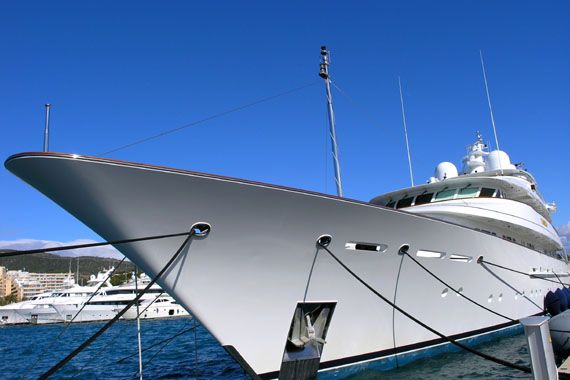
Unlike a house, it is perfectly possible to buy a superyacht without any legal formalities. The dangers of doing this are incalculable and a detailed agreement must be drawn up. The contract to buy and sell, covering all the ifs and buts, is contained in a single legally binding document called a Memorandum of Agreement (MOA), which is signed by both parties. 10% of the purchase price is normally paid straight away, with the balance only being paid once the superyacht and the all-important documentation have been formally handed-over to you at the agreed time and place.
The two other keys documents are the Bill of Sale, which formally records the transfer of legal title from buyer to seller, and the Protocol of Delivery & Acceptance, which sets out the exact time and date of the transfer - to ensure that insurance cover is seamless.
It is entirely up to you to check exactly what is being bought. This means having the superyacht surveyed, out of the water, by a qualified and insured surveyor. If satisfactory, this should be followed by a sea trial. As these stages are expensive, the MOA needs to describe the parties' rights and duties when issues are raised, including your right to pull out altogether.
The MOA should list all the equipment which is to be included in the sale: not just safety and navigation equipment but linen, crockery, and works of art. Superyachts can also carry vast quantities of expensive fuel and engine spares, which you should ensure do not make their way ashore before the sale completes.

As surprising as it may seem, superyachts can be "arrested" and sold if the owner doesn't pay anyone who has supplied goods or services to that vessel. It's as if the vessel itself owes the money. Such debts stay glued to the superyacht even after having been sold to an unsuspecting buyer. Although some debts, such as mortgages, can be seen by looking at the superyacht's entry in the relevant registry, most debts aren't listed anywhere. Crucially, the MOA must state that the vessel will be handed over free of debts. Guarantees against these liabilities, from a reliable guarantor, are also a must as the actual seller will usually just be an offshore shelf company with no other assets.
The MOA should cover other matters such as the documentation needed to enable a smooth transfer of legal title. Further, as charters are usually booked many months in advance, it's important to make sure that you, not the old owner, will receive the charter fees, and that you are happy with the terms of the charter itself.
Although using one of the standard MOAs saves re-inventing the wheel, some favour you and others the seller. Given the complexities of superyacht ownership, using an unamended contract can lead to disaster, and bespoke terms must be agreed.
Read the entire article for a complete and in-depth look at buying a super yacht









